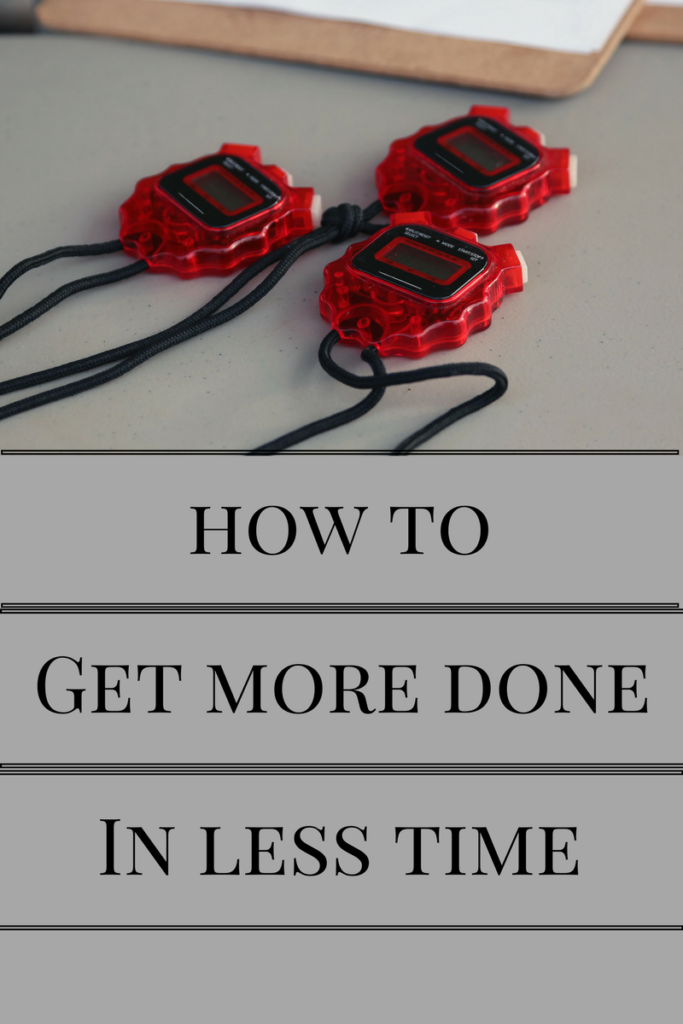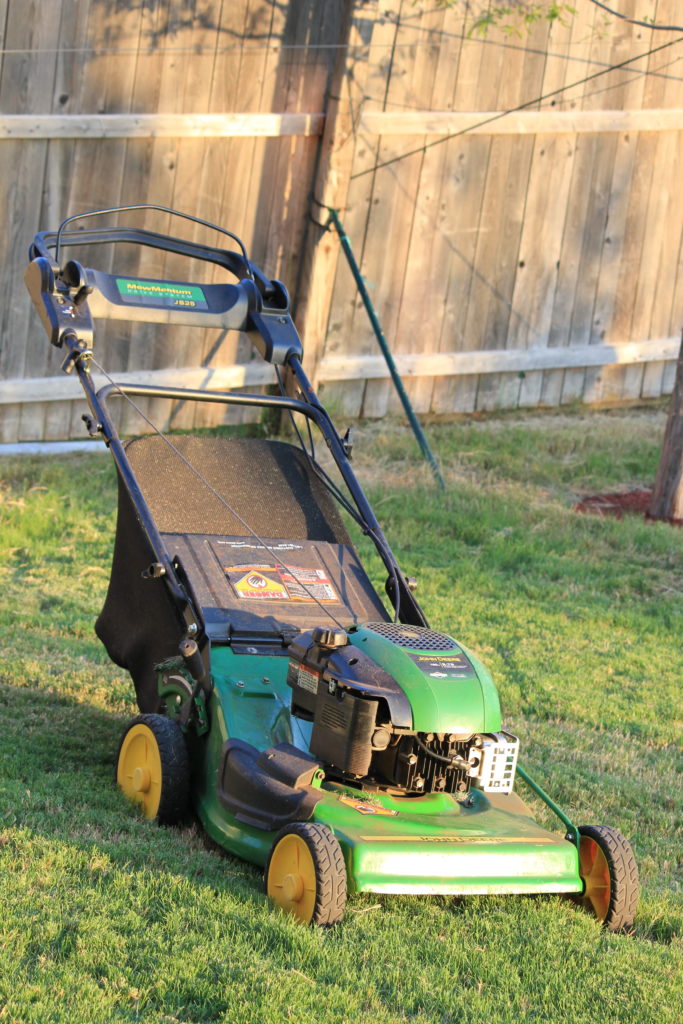How to get more done in less time
Most people want to be organized for one reason: They can get more done in less time. Accomplishing more in less time seems to have become the mantra of the business world, and it’s carrying over into all aspects of life. For many people this is a real challenge.
Tips to get more done in less time
Organization
Being organized is essential for dealing with your affairs efficiently. Let’s face it, no one can deal with their affairs efficiently if they spend half their time looking for keys, cell phones, briefcases… Nor are you organized if you forget important events like meetings, special events, and deadlines.
I’m a very organized person. I can sit down at my desk at home or work and tell you exactly what needs to get done today, this week, this month. What needs to get done will get done on time (almost always).
I can tell you where all of my tools of trade are—and, I don’t mean pointing at a large building and saying, “Over there.” I’m talking about walking into the building, straight to the item I need: Everything has a home. Being organized saves lots of valuable time and resources that would, otherwise, be lost searching for needed tools and materials (if they were ever found!).
As awesome as being organized is, I needed to take my productivity to the next level. There is more to accomplishing your workload than knowing were every pencil, clip board, and wrench is. I just spent some time emphasizing organization, so I won’t trivialize its importance. But … It’s what we do after we’re organized that can yield a profit of time (and—often—money). I will show you how I’ve taken my productivity to the next level.
Get more done in less time
90% of what we do is not important. That’s a pretty startling statement. But, it’s true. Most of what we do doesn’t get us any closer to reaching our goals than if we had done nothing.
Here are a few examples from my life: Email is so necessary, but there is so much ejunk to plow thru every day. That’s a time hog! I, finally, reached these conclusions: (1) If it’s an advertisement, I don’t read it. I delete it. (2) If I’m not expecting it, I delete it. There are more important things to do. I don’t have the time to read ejunk. I used to spend two hours a day on email. Now, I spend fifteen minutes. That alone frees up 1 hour and 45 minutes i can dedicate to something else, and yes i’m getting more done in less time.
The phone is a wonderful invention. Like most people, I have a cell phone. One cell phone feature I am very grateful for is Caller ID. Even if you still use a land line, Caller ID should be available. Long ago (I’m showing my age here.), before Caller ID, the phone had to be answered every time it rang. Who knew which calls were important—or not. Even for awhile after I had Caller ID, I felt I had to answer every ring; I didn’t want to appear to be rude. But, guess what? … At some point, I realized that many of the calls were a waste of time. They didn’t contribute anything to my goals. They ate up time. That made them not just a waste of time, but a HUGE waste of time, which—often—transmuted into a waste of resources and money.
Now, when the phone rings, I check Caller ID. If the phone call is not likely to be productive, I don’t answer it. I have the number. If I want, I can return the call later. I can be quite productive in time spent not talking about who won the game last night, who is seeing who, or listening to somebody telling me I just won a free vacation.
There are exceptions to every rule. One exception: If my wife calls, I answer the phone. (Unless it’s an emergency, she never bothers me at work.) And, of course, if my boss calls, it’s a no brainer. I answer his calls.
Rating terms
So that we’re on the same page, let’s define some terms.
Important: The outcome of an important activity leads to achieving goals. These activities deserve our greatest attention.
Urgent: Urgent activities demand immediate attention. They are, usually, associated with achieving someone else’s goals. You won’t be able to avoid all urgent activities, but remember where your interests lie. Avoid other people’s urgencies when possible.
Worthless Activity: Worthless activities are a complete waste of time. They are counterproductive. When you find you are involved in a worthless activity—just stop.
Here’s my plan
Work efficiently.
Parkinson’s Law states, “Work expands so as to fill the time available for its completion.” In short, if you assign an hour to complete a task, it will take an hour to complete. And, if you allow two hours to complete the same task … You can take bets: It will take the full two hours to accomplish.
I make a schedule. I designate a time frame for every task. The amount of time assigned needs to be reasonable. It’s quite possible that major projects will need to be accomplished in stages.
Work with a timer. Pick something convenient and easy to use; most cell phones have a timing function.
When it’s time to perform a task, I eliminate distractions. I don’t answer the phone (wife and boss being the exceptions). I don’t check my email one more time. I don’t’ hang out at the water cooler.
I set my timer and focus on what I’m doing. During this time period, I do not look at other projects (or phases of this project) unless they have a significant interface with what I’m working on. I work as if the assigned time slot is critical, as if there will be no more time. I want to accomplish what I set out to do in the time I’ve allowed.
Of course, there are times the task does not get done in the amount of time I planned. When this happens, I reschedule the task, assign it a new time, and move on to the next item. (It’s always nice when I don’t have anything planned for the next block of time. I can continue to work on the uncompleted project until it’s done or until the next scheduled event comes up.)
Note: earlier is said i focus on what i’m doing. That means no day dreaming i make it a point to considerate on the task at hand. I work diligently so i can accomplish more in less time. It’s a goal.
Without sacrificing quality, I make it a point to push myself to new levels of efficiency. I’ve become good at accomplishing a lot in a short period of time. It increases my out-put at work and leisure time at home.
Here’s an example of the latter from when we lived in South Carolina: Every couple of weeks, I mowed a neighbor’s lawn. Usually, it took me an hour and a half. One Saturday I had tickets to the Dock Street Theater. We needed to leave the house in about two hours. That same day I was supposed to do the mowing job. I’d put it off all day—and it needed to be done. (This was before I was really dedicated to efficiency and keeping to a schedule.) Ok, I had two hours. Hadn’t even started the mower… Definitely, would need a shower after the job was done… Unless I could reduce the amount of time I spent mowing, I wasn’t going to make it before the curtain went up. I envisioned the job, and saw where I could accomplish more in less time. I decided to get that lawn mowed in an hour. I eliminated distractions—chitchat with the neighbor, a coffee break, a couple of other little things. I got thru mowing the lawn in the allotted hour, had time for my shower, and made it to the play in plenty of time.
That event turned out well—especially, since it was (mostly) impromptu. Things don’t always come together quite so easily. Occasionally, I’ll underestimate the amount of time a project will take. In these cases organization and scheduling offer the solution. I can look at my calendar, immediately see my time requirements, and how I can reallocate them.
Conclusion
How to get more done in less time has become the business buzz word. In order to get more done you will need to change some casual habits. Being organized is important—know where your tools are. Use your calendar to schedule your work. When working, eliminate distractions, be focused
Never miss another post follow me on Facebook


